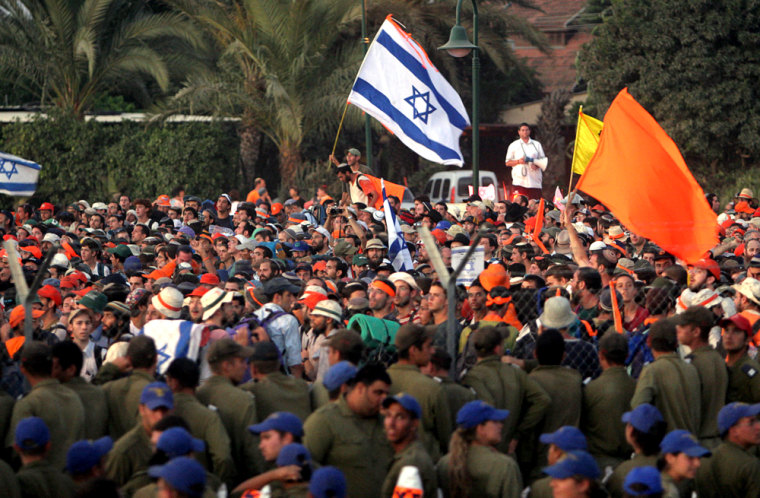Gaza pullout opponents admitted defeat late Wednesday in what they hoped would be their most formidable protest yet — and began going home without completing a desert march to reinforce Jewish settlers. The movement appeared increasingly chaotic as the date for Israel’s withdrawal nears.
Around midnight, after a third hot day of fruitless negotiations with police and the military, organizers told the crowd that buses awaited to take them home if they wanted to leave, signaling the end of the demonstration — though appeals were made for protesters to remain in the village of Kfar Maimon.
Bentsi Lieberman, settlers’ council head, told more than 10,000 followers — surrounded by twice that many security forces — that their plans for a mass march were over.
Buses began taking some demonstrators away, while others hunkered down under the stars.
Earlier thousands of settlers and their backers, most of them Orthodox Jewish teenagers and young adults with children, milled around the main gate of the village, 12 miles from Gaza, as their leaders and rabbis negotiated with police and soldiers.
As the protest was developing, the withdrawal opponents suffered another blow when parliament overwhelmingly rejected a last-ditch proposal to delay by a year the scheduled mid-August withdrawal from Gaza and four West Bank settlements.
“It proved that the government, the Knesset and the public support the disengagement,” Israeli Prime Minister Ariel Sharon said.
Opposed by 20,000 soldiers — and baking sun
As the vote came, the thousands of would-be marchers baked in the blazing summer sun for the third day in Kfar Maimon. About 20,000 police and soldiers were stationed to prevent them from marching to Gaza.
The settlers, once a powerful political force, find themselves marginalized, said Nahum Barnea, a columnist for the Yediot Ahronot daily. “They are emotionally very, very frustrated. They don’t know what to do,” he told The Associated Press.
“It seems unlikely” that opponents can stop the pullout, said one despondent protester, Ari Shames, 36. But he added that he hopes for a last-minute miracle.
The protesters’ tactics vary. Some have sought to persuade police to disobey orders calling for them to remove settlers from their homes. Others have pushed and shoved police in the belief the government will only respond to strong-arm tactics.
The contradictory and seemingly uncoordinated efforts are a far cry from the settlers’ previous attempts to defeat the pullout, which kicked into gear the minute Sharon announced his plan last year.
Early protest success
Their campaign produced some astounding successes. They sent settlers and their children to make personal appeals to members of Sharon’s Likud Party, leading to the plan’s surprise defeat in a party referendum.
Sharon pushed on anyway. When opponents persuaded nearly one-third of Likud lawmakers to rebel against Sharon and try to bring down their own government, he formed a new coalition with the moderate Labor Party. On Wednesday, parliament voted 69-41 against delaying the pullout for a year.
The opponents had blanketed the country with demonstrations, posters and orange ribbons of protest, and the protests are credited with helping reduce public backing for the pullout — though more than half the country still supports it, according to recent polls.
Fatah-Hamas clash ends
In Gaza City, meanwhile, the ruling Fatah party and the opposition Hamas said their armed confrontation of several days is over, but Egyptian mediators said they would stay until after the Israeli pullout to make sure internal fighting does not flare up.
The two rivals are vying for control of Gaza after Israel leaves. Early Wednesday, the sides announced an agreement to take their gunmen off the streets and restore calm. A few hours later, gunmen opened fire on the homes of Palestinian police chief Rashid Abu Shbak and Fatah leader Abdullah Franji. No one was hurt.
Ismail Haniyeh, a Hamas leader, called on Hamas members to show restraint. Sufian Abu Zaydeh, a Fatah leader and Cabinet minister, said the situation was under control.
Egypt has played a key role in mediating between rival factions. In an effort to ensure a smooth handover from Israel to the Palestinians, Egypt will send army officers and post one in each Palestinian security unit taking control of areas Israel evacuates, an Egyptian official said. The officers are to arrive this week, he said.
